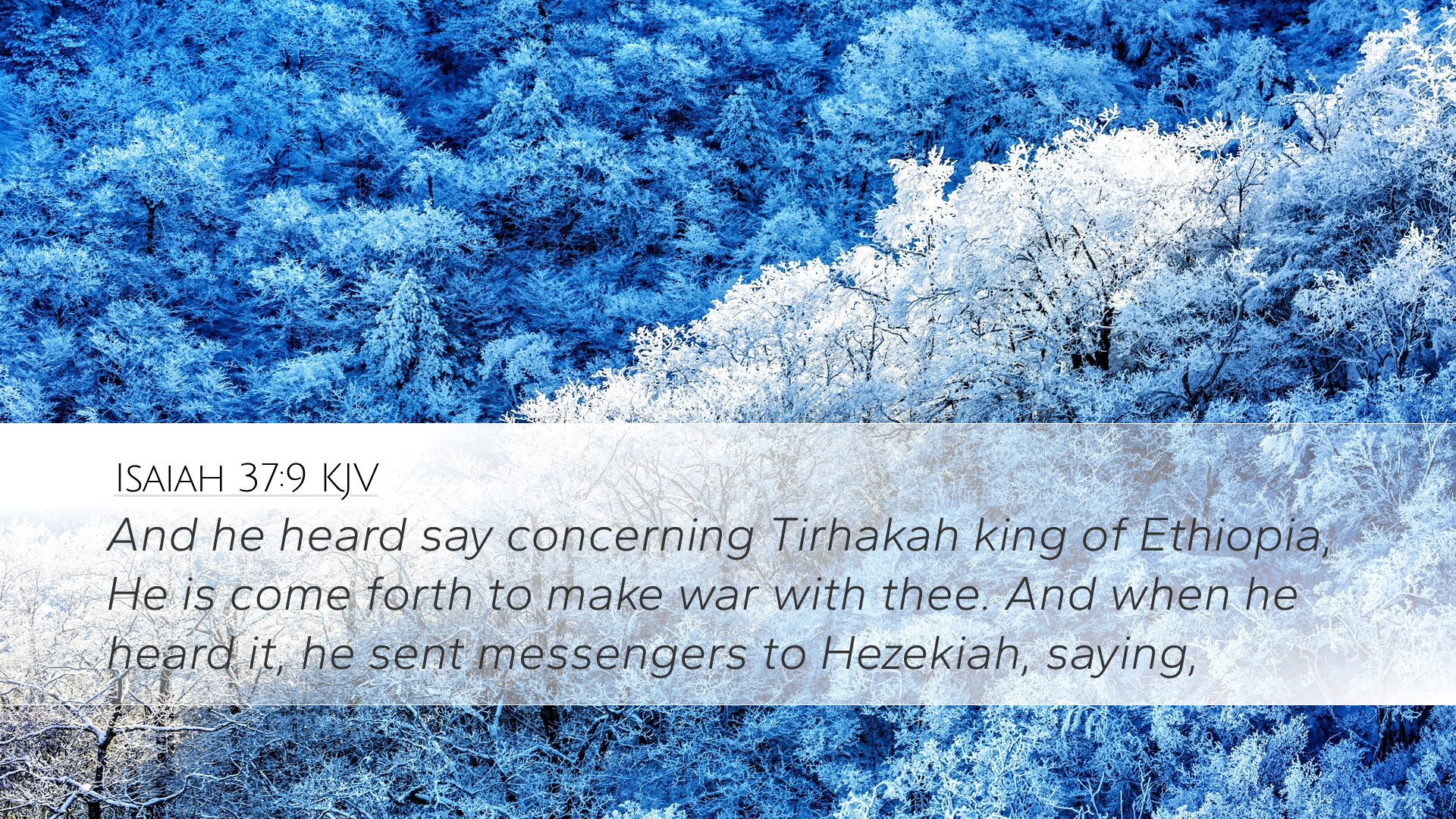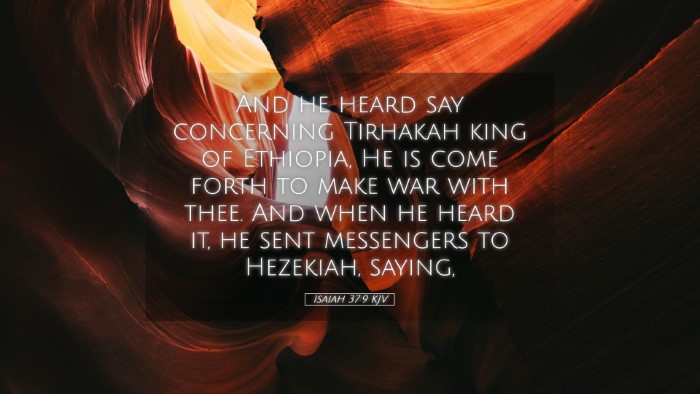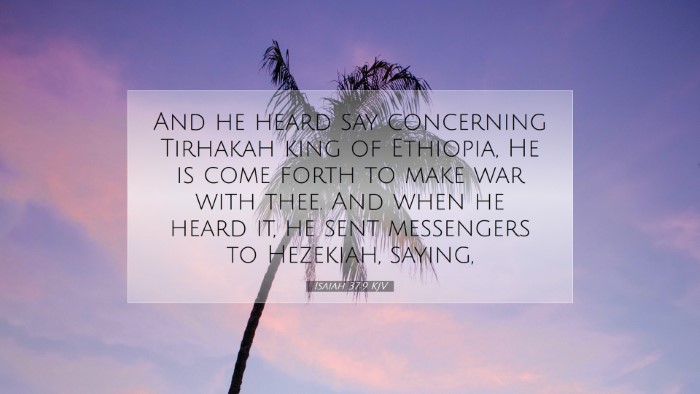Commentary on Isaiah 37:9
Isaiah 37:9 states: "And he heard say concerning Tirhakah king of Ethiopia, He is come forth to make war with thee: and when he heard it, he sent messengers to Hezekiah, saying," This verse forms a crucial hinge in the narrative of Judah’s deliverance from Assyria, linking the political unrest of the time with divine providence and human response.
Contextual Background
The historical context is critical for understanding this passage. King Hezekiah of Judah is facing the threats of Sennacherib, the king of Assyria, who has already conquered many territories and now seeks to annex Judah. Tirhakah, the king of Ethiopia, poses a potential ally, representing a glimmer of hope for Hezekiah and his people.
Theological Insights
- The Sovereignty of God: The mention of Tirhakah is illustrative of God’s overarching control over the kingdoms of men. The Assyrian king, in hearing the news of Tirhakah, displays a fear that is unwarranted if viewed from the perspective of divine sovereignty. God orchestrates the events, reminding His people of their dependence on Him and not earthly powers.
- Human Agency: Hezekiah’s situation compels him to be proactive. The announcement of Tirhakah serves as both a warning and an opportunity. In a similar manner, this teaches contemporary believers the importance of seeking allies and making efforts in the face of adversity, while ultimately trusting in God.
- Divine Communication: The verse implies a channel of communication that is often overlooked. God doesn’t just act; He informs and prepares His people for His intervention. Hezekiah's reaction to this news can lead to a deeper understanding of prayer and seeking guidance amidst trouble.
Insights from Public Domain Commentaries
Matthew Henry's Commentary
Henry emphasizes the importance of evaluating the reactions of both Sennacherib and Hezekiah in this passage. He suggests that the king of Assyria hears the news with perturbation, showcasing his anxiety. This reaction demonstrates that even the mightiest rulers are subject to the unseen hand of God.
Furthermore, Henry notes that God could have struck down Sennacherib at any moment, but chooses to use circumstances like Tirhakah’s invasion to demonstrate His power further. The providential use of surrounding nations as instruments reminds us of how God employs extraordinary means to fulfill His purposes.
Albert Barnes' Notes
Barnes elaborates on the character of Tirhakah, painting him as a significant force against Assyria. He inspects the political landscape, noting that Tirhakah's involvement serves to disrupt Sennacherib’s plans. This introduction of an adversary adds to the narrative tension and illustrates how God can raise opposition against those who oppress His people.
Moreover, Barnes emphasizes that the report of Tirhakah reaching Sennacherib offers a reminder that no power stands against God’s will. Barnes interprets Sennacherib’s and Hezekiah’s paths as a representation of the broader struggle between righteousness and tyranny, showcasing divine justice at work. Through his insights, pastors are reminded that God often uses means both direct and indirect to achieve His ends.
Adam Clarke's Commentary
Clarke provides a rich analysis of the geopolitical implications of Tirhakah's actions. He notes that this moment signifies a shift in the balance of power in the region, suggesting that God’s providence extends to the affairs of the nations. The involvement of Ethiopia serves as a means of reminding the Israelites of their alliances, encouraging them to seek help beyond their borders when under siege.
Clarke’s articulation on the biblical concept of trust offers deeper insight. He argues that Hezekiah’s response to news of war should mirror contemporary faith responses; trust in God should permeate our actions and thoughts during trials. Clarke's commentary invites theologians to reflect on the integrity of faith through adversity and on how divine assistance can manifest through expected and unexpected channels.
Applications for Today
- Trust in Divine Sovereignty: Believers today are called to recognize that God remains sovereign over world events. Instead of succumbing to fear or anxiety, one must cultivate faith in God, who orchestrates all things according to His divine purpose.
- The Importance of Prayer: In times of distress, as demonstrated by Hezekiah, turning to God through prayer is essential. He initiated communication with God while simultaneously preparing for the potential threat, showing the balance of faith and action.
- Recognizing God’s Work Through Others: Just as Tirhakah served as an unexpected ally to Hezekiah, God often uses people in our lives whom we might overlook. It’s essential for believers to remain open to how God might provide support through various means.
Conclusion
Isaiah 37:9 encapsulates a moment where the mere advent of news transformed the landscape of war in Judah. It challenges readers to understand the broader themes of divine sovereignty, human responsibility, and the nuances of faith in action. As pastors, students, and scholars reflect on this passage, they are encouraged to delve deeper into how God interacts with His people against the backdrop of historical and political turmoil, thereby discerning lessons applicable to our contemporary faith journey.


